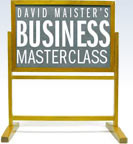

TITLE | TIME |
It’s Not How Good You Are, But How Much You Want It | (17:00) |
Business Masterclass host David Maister shares his insights into how his writing and consulting career came about and what those experiences taught him – along with specific takeaway lessons to make your career more exciting, fulfilling and successful
RELATED RESOURCES:
Blog Discussions
NOTES FOR THE EPISODE:
00:29 — How David’s writing and consulting career came about and what those experiences taught him.
Like many people, I had no idea what I wanted to do with my life when I left college. I took a job as a statistician because that’s what my undergraduate degree had been in. I soon discovered that it was neither my passion nor my area of special talent. So, because I couldn’t think of anything else to do, I went back to school for a Master’s degree, taking a teaching job to support myself.
05:53 — The secret of force and momentum for a successful business career
“Find your passion” is common career advice. But less frequently pointed out is how difficult this can be. You really need to work hard to find out what you can be passionate about. Unless you are very lucky, you may find that, like me, it takes many years to discover what really turns you on, long-term
09:06 — Three-point checklist for personal success
Once you have found something to try, you must then throw yourself into it and work at it with as much commitment as you can muster until you can answer three questions:
- Is it as exciting as I thought it was going to be?
- Is there a market for this? (Will anyone pay me to do it?) and
- Can I make a contribution that others are not (yet) making?
10:22 — Determination: the only sustainable competitive advantage
Sheer determination is the only explanation I can offer as to why I took these career risks. Looking back, I am amazed at the chances I took, and am grateful that they worked out (almost always with setbacks along the way.). I often feel that my career has been one of “stumbling upwards.”
12:59 — Bouncing back from setbacks
If people sometimes lose sight of the need for energy and “force” because their momentum is carrying them, they also lose drive and energy when they have to deal with setbacks. Things that didn’t really go so well. A missed promotion. Ungrateful superiors, colleagues, or clients who fail to acknowledge a contribution.
We all have setbacks, whether they were our fault or not. The question then becomes: What are you going to do now? Withdraw, or renew your efforts?
15:23 — A personal postscript on how David applied these lessons himself
A final autobiographical note. In my mid-50s, after having written a book per year for three years in a row, I suddenly found myself without energy. The lethargy lasted for more than two years, and I have never been so miserable in my entire life.

















